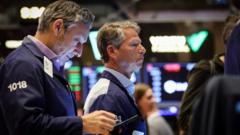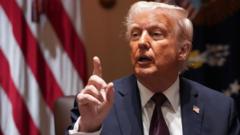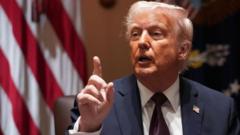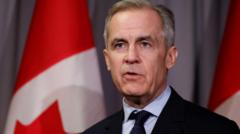Amidst fears of a potential trade war, President Trump's suggestion of sweeping import tariffs has pushed markets into a state of flux. While US stocks exhibit resilience, global counterparts struggle, reflecting investor concern over the economic ramifications.
Global Markets React to Trump Tariff Announcement as Investors Weigh Impact

Global Markets React to Trump Tariff Announcement as Investors Weigh Impact
Investors face uncertainty as new US tariffs loom, shaking global stock markets and reviving trade war fears.
In a time of heightened tension in the trade landscape, US stock markets have shown signs of resilience despite the looming threat of new tariffs proposed by President Donald Trump. Markets across Asia and Europe, however, are not faring as well, showing increased vulnerability to the uncertainty that Trump's import tax plans have created.
Trump's upcoming tariff announcements, termed by him as "America's Liberation Day," are predicted to affect nearly "all countries," further inciting fears of a potential trade war. Known for introducing tariffs on steel, aluminium, and automobiles, Trump's stance appears to be evolving. Initially indicating that some countries might receive breaks, his recent comments suggest a more comprehensive range is likely, with a focus on beginning with broad territories.
This looming tariff challenge has caused trepidation particularly among US investors, who have witnessed a significant decline in the S&P 500 index, nosediving nearly 10% since mid-February. March marks a particularly dismal month for US stocks, with the Nasdaq reporting its worst quarterly performance since 2022. While US markets opened lower, they stabilized throughout the day; the Dow closed 1% higher and the S&P 0.5% up, yet the Nasdaq slipped minimally.
In contrast, stocks in Japan, the UK, Germany, and France all fell sharply in response to the unsettling news, with Japan's Nikkei 225 dropping by over 4%. Gold prices surged to record highs, suggesting that investors are seeking safer harbors amid market instability.
According to analysts, the uncertainty surrounding the tariffs, once implemented, is likely to have long-lasting ramifications. Japan, heavily dependent on exports, is poised to suffer particularly given its significant presence in global automotive and semiconductor industries.
Trump advocates for these import tariffs as a strategy to renegotiate trade agreements while simultaneously bolstering the American workforce. A recent White House fact sheet claimed that a 10% tariff could lead to the creation of nearly three million US jobs, with Trump’s trade advisor projecting that planned tariffs could yield $600 billion annually.
However, businesses across various sectors express trepidation about the potential impact of these tariffs. Companies like Brompton Bicycle, which relies on US sales for a substantial part of its revenue, might reconsider their investment strategies due to the competitiveness implications posed by these new fees. CEO Will Butler-Adams articulated concerns about the necessity of adapting to the tariff framework, suggesting a chilling effect on investment and growth in the US market.
On a separate note, Trump has also indicated that an impending deadline for TikTok's owner ByteDance to find a suitable buyer looms, with national security concerns driving negotiations to a critical juncture.
With global markets in a state of apprehension and businesses preparing for the ripple effects of potential tariffs, the coming days are sure to be pivotal in defining not just the US economy but also international trade relations.
Trump's upcoming tariff announcements, termed by him as "America's Liberation Day," are predicted to affect nearly "all countries," further inciting fears of a potential trade war. Known for introducing tariffs on steel, aluminium, and automobiles, Trump's stance appears to be evolving. Initially indicating that some countries might receive breaks, his recent comments suggest a more comprehensive range is likely, with a focus on beginning with broad territories.
This looming tariff challenge has caused trepidation particularly among US investors, who have witnessed a significant decline in the S&P 500 index, nosediving nearly 10% since mid-February. March marks a particularly dismal month for US stocks, with the Nasdaq reporting its worst quarterly performance since 2022. While US markets opened lower, they stabilized throughout the day; the Dow closed 1% higher and the S&P 0.5% up, yet the Nasdaq slipped minimally.
In contrast, stocks in Japan, the UK, Germany, and France all fell sharply in response to the unsettling news, with Japan's Nikkei 225 dropping by over 4%. Gold prices surged to record highs, suggesting that investors are seeking safer harbors amid market instability.
According to analysts, the uncertainty surrounding the tariffs, once implemented, is likely to have long-lasting ramifications. Japan, heavily dependent on exports, is poised to suffer particularly given its significant presence in global automotive and semiconductor industries.
Trump advocates for these import tariffs as a strategy to renegotiate trade agreements while simultaneously bolstering the American workforce. A recent White House fact sheet claimed that a 10% tariff could lead to the creation of nearly three million US jobs, with Trump’s trade advisor projecting that planned tariffs could yield $600 billion annually.
However, businesses across various sectors express trepidation about the potential impact of these tariffs. Companies like Brompton Bicycle, which relies on US sales for a substantial part of its revenue, might reconsider their investment strategies due to the competitiveness implications posed by these new fees. CEO Will Butler-Adams articulated concerns about the necessity of adapting to the tariff framework, suggesting a chilling effect on investment and growth in the US market.
On a separate note, Trump has also indicated that an impending deadline for TikTok's owner ByteDance to find a suitable buyer looms, with national security concerns driving negotiations to a critical juncture.
With global markets in a state of apprehension and businesses preparing for the ripple effects of potential tariffs, the coming days are sure to be pivotal in defining not just the US economy but also international trade relations.























